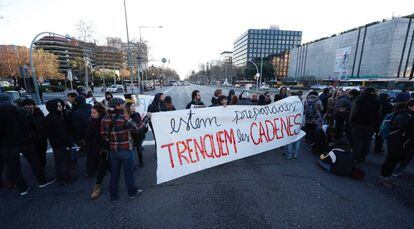German judge keeps Catalan leader in custody pending extradition decision
Spain wants to try Carles Puigdemont for rebellion, for which closest German equivalent is high treason

A court in the northern German town of Neumünster has decided to keep former Catalan premier Carles Puigdemont in custody pending a decision on his extradition to Spain.
The secessionist leader, who was arrested in Germany on Sunday as he traveled from Finland to Belgium by car, will remain in detention until the European arrest warrant issued by Spain is resolved, said the Schleswig-Holstein state court.
There is no precedent in Germany for a case like Puigdemont’s
Nikolaos Gazeas, German law professor
Germany now has 60 days to decide whether to extradite Puigdemont to Spain, where he is wanted on charges of rebellion, sedition and misuse of public funds in connection with the illegal referendum of October 1 and the unilateral independence declaration.
On Tuesday morning members of the Committees in Defense of the Republic (CDR), a grassroots movement with ties to left-wing independence groups, cut off several roads in Catalonia to protest Puigdemont’s arrest and imprisonment. Protesters stopped traffic both ways on the AP-7, a major artery connecting Catalonia and France, near the town of Figueres.

Meanwhile, separatist parties in the Catalan parliament have called a special session on Wednesday morning to pass a non-binding resolution calling for Puigdemont, Jordi Turull and Jordi Sànchez – the three failed candidates to the premiership – to be “guaranteed their right” to bid for office. Parliamentary bylaws say that nominees must be physically present at the investiture debate.
Calm and serene
At his Monday afternoon hearing, where a judge confirmed his identity and decided to keep him in custody, Puigdemont appeared “calm and serene,” said the Schleswig-Holstein state prosecutor Georg-Friedrich Guentge. German authorities announced the decision at around 8pm, and have declined to comment on the case.

Experts on German criminal law consulted by this newspaper said that the Catalan leader will almost certainly be handed over to Spain, but that the real question is on what charges. Spain is accusing Puigdemont of rebellion, which has a near equivalent in Germany, high treason. But these experts noted that the charge requires evidence of “violence or threat of violence” by the accused, and this could be difficult to prove.
“It’s not about comparing [the laws] literally, it’s about analyzing Puigdemont’s behavior in the fall of 2017, and see whether it was criminal or not,” explains Martin Heger, a professor of criminal law at Humboldt University in Berlin. “German judges have to see if Puigdemont incurred in violence. It doesn’t have to be physical violence, but it is necessary for him to have exerted some form of pressure.”
Nikolaos Gazeas, a German professor of international criminal law, says that while “it is true that there are similarities between rebellion and high treason, we need to keep in mind that judges will consider whether, if those same acts had taken place in Germany, they would have constituted a crime.”
As for the misuse of public funds charge, “the double criminality is clear,” said Heger, alluding to a requirement that the charge for which a person is wanted in one country must also constitute a crime in the country receiving the extradition request.
Charged with what?
If Germany extradites Puigdemont but denies the rebellion charge, the top leader of the secessionist drive could end up being tried in Spain only for misuse of public funds, while his aides who remained behind – including his ex-deputy Oriol Junqueras, leader of the Catalan Republican Left – face the much more serious charges of sedition and rebellion.
The Puigdemont case is a complex one, as there is barely any precedent in German case law to use as a reference, or to provide clues as to what it means to exercise violence in the context of high treason.
Heger explains that in the late 1940s the Supreme Court saw a case against the Communist Party, which tried to destabilize the government with a massive strike that was considered an act in preparation of high treason.
“That strike was considered violence, but evidently the notion of violence has changed through the decades. It is very difficult to know what the judges will say. Failing to mobilize the regional police [against voters in the October 1 referendum] could be viewed as violence, but it’s only a possibility,” said Heger.
Gazeas agreed: “There is no precedent in Germany for a case like Puigdemont’s.”
English version by Susana Urra.












































